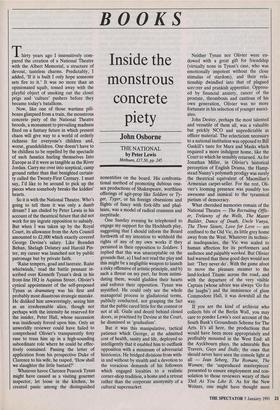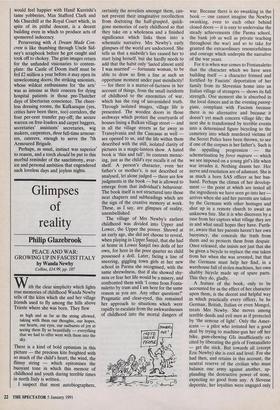BOOKS
Inside the monstrous concrete piety
John Osborne
THE NATIONAL by Peter Lewis Methuen, £17.50, pp. 245 Thirty years ago I insensitively com- pared the creation of a National Theatre with the Albert Memorial, a structure of devout, tasteless charms. Predictably, I added, 'If it is built I only hope someone sets fire to it.' It was no more than an opinionated squib, tossed away with the playful object of smoking out the closet prigs and 'culture' pushers before they became today's batallions.
Now, like one of those wartime pill- boxes glimpsed from a train, the monstrous concrete piety of the National Theatre broods, a monument to prevailing madness fixed on a fantasy future in which present chaos will give way to a world of orderly richness for everyone's children and, worse, grandchildren. One doesn't have to be childless to be repelled by the spectacle of such fanatics hurling themselves Into Europe as if it were as tangible as the River Jordan. Carry me over into sceptical, camp ground rather than that benighted certain- ty called the Twenty-First Century. I must say, I'd like to be around to pick up the pieces when somebody breaks the kiddies' hearts.
So it is with the National Theatre. Who's going to tell them it was only a dumb dream? I am chided by Peter Lewis in his account of the theatrical future that did not work for my ingrate opposition to subsidy. But when I was taken up by the Royal Court, its allowance from the Arts Council amounted to £2,000 which exactly covered George Devine's salary. Like Brendan Behan, Shelagh Delaney and Harold Pin- ter, my career was launched not by public patronage but by private faith.
`Raise tempers, goad and lacerate. Raise whirlwinds,' read the battle pennant in- scribed over Kenneth Tynan's desk in his front-line HQ in Aquinas Street. Olivier's cynical appointment of the self-proposed Tynan as dramaturg was his first and probably most disastrous strategic mistake. He disliked him unwaveringly, seeing him as an irredeemable alien, though not perhaps with the intensity he reserved for the insider, Peter Hall, whose succession was insidiously forced upon him. Only an unworldly reviewer could have failed to comprehend Olivier's transparently foxy ruse to truss him up in a high-sounding subordinate role where he could be effec- tively contained. Passing the letter of application from his prospective Duke of Clarence to his wife, he rasped, 'How shall we slaughter the little bastard?'
Whatever havoc Clarence Peacock Tynan might have caused as a visiting gourmet inspector, let loose in the kitchen, he created panic among the distinguished nonentities on the board. His confronta- tional method of promoting dubious one- sex productions of Shakespeare, worthless offerings of agit-prop like Soldiers or Ty- ger, Tyger, or his foreign obsessions and flights of fancy with fork-lifts and phal- luses, was a model of radical crassness and ineptitude.
One Sunday evening he telephoned to engage my support for the Hochhuth play, suggesting that I should inform the Board forthwith of my intention to withhold the rights of any of my own works if they persisted in their opposition to Soldiers. I replied that this was unacceptable on the grounds that, a) I had not read the play and this might be a negligible weapon to launch a risky offensive of artistic principle, and b) such a threat on my part, far from intimi- dating them, would gladden their hearts and enforce their opposition. Tynan was mystified. He could only see the whole managerial process in gladiatorial terms, publicly conducted, not grasping the fact that the public cared little for the contest or not at all. Guile and deceit behind closed doors, as practised by Devine at the Court, he dismissed as 'gradualism'.
But it was this manipulative, tactical patience which George, at the admitted cost of health, sanity and life, deployed so intelligently that it enabled him to outflank opposition with a minimum of adversarial histrionics. He bridged divisions from with- in and without by stealth and a devotion to the voracious demands of his followers which engaged loyalties to a realistic corner-shop tradition, a home and a retreat rather than the corporate anonymity of a cultural supermarket. Neither Tynan nor Olivier were en- dowed with a great gift for friendship (virtually none in Tynan's case, who was emotionally impotent without the close stimulus of stardom), and their rela- tionship dwindled into that of plagued sorcerer and prankish apprentice. Oppress- ed by financial anxiety, cancer of the prostate, thrombosis and cautious of his own generation, Olivier was no more fortunate in his selection of younger associ- ates.
John Dexter, perhaps the most talented and versatile of them all, was a valuable but prickly NCO and unpredictable as officer material. The eclecticism necessary to a national institution was opposed to Bill Gaskill's taste for Marx and Masks which required a more indulgent home, like the Court to which he sensibly returned. As for Jonathan Miller, in Olivier's historical perception of English Drama, the Hamp- stead Nanny's polymath prodigy was surely the theatrical equivalent of Macmillan's Armenian carpet-seller. For the rest, Oli- vier's looming presence was possibly too awesome and inimical to the tyrannical pietism of democracy.
What cherished memories remain of the National Theatre — The Recruiting Offic- er, Trelawny of the Wells, The Master Builder, Dance of Death, Uncle Vanya, The Three Sisters, Love for Love — are confined to the Old Vic, its little grey home away from the West. Whatever its technic- al inadequacies, the Vic was scaled to human affection for its performers and audience and palpably worked. But Olivier had warned that these good days would not last: 'They never do'. With the game afoot to move the pleasure steamer to the land-locked Titanic across the road,. and with the departure of the very visible Captain (whose advice was always 'Go for the laughs') and the imminence of glum Commodore Hall, it was downhill all the way.
If you are the kind of archivist who collects bits of the Berlin Wall, you may care to ponder Lewis's cool account of the South Bank's Groundnuts Scheme for The Arts. It's all here, the productions that would have been more appropriately and profitably mounted in the West End: all the Ayckbourn plays, the admirable Ben Travers, Guys and Dolls; the ones that should never have seen the console light at all — Jean Seberg, The Romans, The Women; the `unproduced masterpieces' presented to ensure employment and con- solation to those reviewers weary of their 33rd As You Like It. As for the New Writers, one might have thought most would feel happier with Hanif Kureishi's tame yobberies, Max Stafford Clark and Ms Churchill at the Royal Court which, in spite of its pitiful descent, is a decent building even in which to produce acts of sponsored indecency.
Persevering with A Dream Made Con- crete is like thumbing through Uncle Sid- ney's scrapbook before he got caught and took off to chokey. The grim images return for the unfunded visionaries to contem- plate: the Castle of Doom itself must be fed £2 million a year before it may open its unwelcoming doors; the striking unionists, whose wildcat enthusiasms for 'the arts' was as intense as their concern for dying hospital patients in those pre-Thatcher days of libertarian conscience. The cheer- less dressing rooms, the Kafkaesque (yes, critics have been there, too) corridors, the four per-cent transfer pay-off; the secure warren on free-loaders and carpet baggers, secretaries' assistants' secretaries, wig makers, carpenters, three full-time armour- ers, caterers, enough to serve the 7th Armoured Brigade.
Perhaps, as usual, instinct was superior* to reason, and a torch should be put to this morbid reminder of the sanctimony, avar- ice and personal ambition that engendered such loveless days and joyless nights.











































 Previous page
Previous page